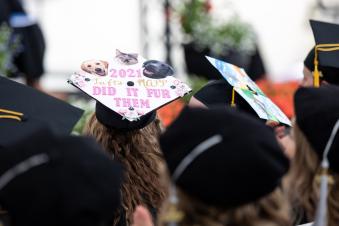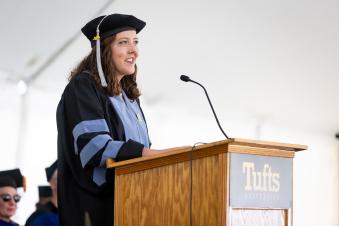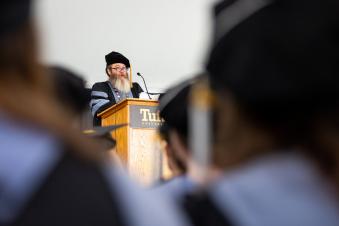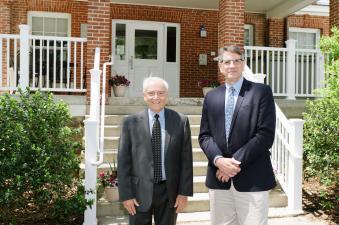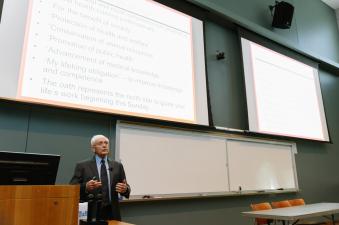-
About
- Leadership & Faculty
- News & Events
-
Academics
- Graduate
- Advanced Clinical Training
- Continuing Education
- Academic Offices
-
Student Life
-
Research
-
Hospitals & Clinics
- Emergency Care
- Hospital Services
-
Community Outreach
- Volunteer
2022 Commencement Celebrated
Forty-three master’s degrees and 98 doctoral degrees awarded
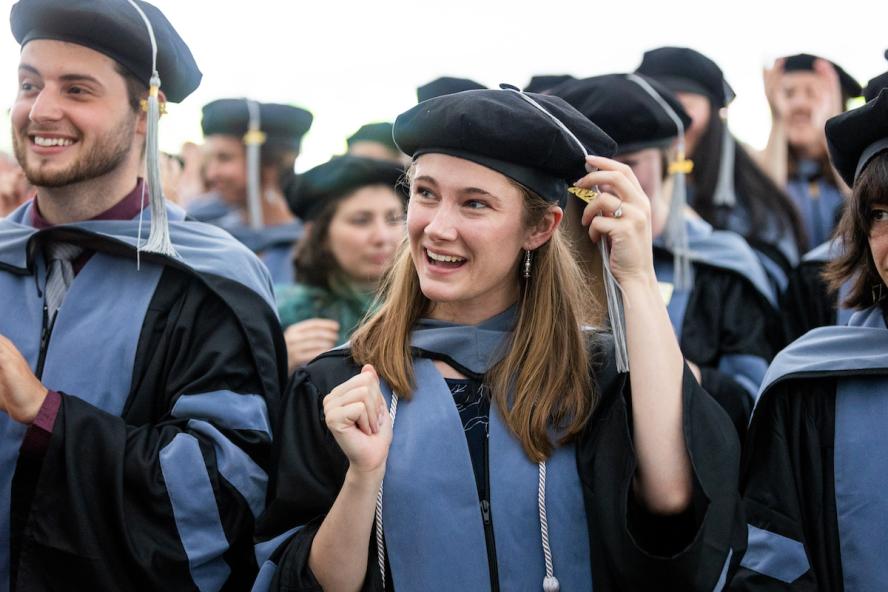
Cummings School of Veterinary Medicine at Tufts University held its 40th Commencement on Sunday, May 22, 2022.
Graduate Program Commencement Ceremony
In a virtual ceremony, 43 master’s degrees were conferred, including 15 Master of Science (M.S.) in Animals and Public Policy, 19 M.S. in Conservation Medicine, and nine M.S. in Infectious Disease and Global Health.
Dean Alastair Cribb professed how the pandemic has highlighted the importance of science over the past two years. “Your degrees and your skills will be essential, moving forward in many areas,” he said, such as addressing antimicrobial resistance, assisting threatened wildlife populations, creating policies to protect animals, and combating climate change, among others.
Representing the Class of 2022, Nirva Patel, VG22, graduated with an M.S. in animals and public policy and provided the student address. “You may wonder what your role will be going forward,” she said to her classmates. “…I have full faith that you will find your path … your education will lead you to make a huge difference.”
Carolyn Talmadge, EG14, an instructor in the Conservation Medicine program and data lab services manager for Tufts Technology Services, presented the faculty address. “I challenge you to continue to advance your knowledge and expertise, take chances when exciting opportunities arise, follow your heart, and continue to be the voice for those that don’t have one,” she advised.
Doctoral Commencement Ceremony
At a ceremony held under a large tent on the Grafton campus later in the afternoon, 98 doctoral degrees were awarded-one Doctor of Philosophy and 97 Doctor of Veterinary Medicine (D.V.M.).
Seven students earned dual D.V.M./Masters’ degrees, one with an M.A. in International Relations, four with an M.S. in Laboratory Animal Medicine, and two with a Master of Public Health. Eleven students earned a postgraduate certificate in International Veterinary Medicine.
Caroline Genco, Ph.D., Tufts University provost and senior vice president ad interim, congratulated the Class of 2022 on behalf of the University, its leadership, and Board of Trustees. “Education in veterinary sciences is one of the cornerstones of our great research university,” she shared. “I’m constantly reminded of the importance of veterinary medicine as it relates to the study of human health and the importance of Cummings School’s collaboration with our medical school … Thank you to those who have dedicated their lives to veterinary medicine … You will always have a home in Grafton and in the greater Tufts community.”
Representing the Massachusetts Veterinary Medical Association (MVMA), President Bonnie Smith, D.V.M., welcomed the graduates into the profession and invited them to become active members of the professional organization, where they can meet, interact, and collaborate with fellow veterinarians from across the Commonwealth of Massachusetts.
Dr. John Berg named faculty emeritus
Distinguished professor John Berg was presented with a faculty emeritus certificate.
Berg joined Cummings School in 1986 and served the institution for 35 years as a gifted leader and teacher. He led the Department of Clinical Sciences as chair for 13 years, received five teaching awards, was selected as the commencement or white coat ceremony speaker three times, and was inducted into the Tufts University Veterinary Alumni Association Faculty Hall of Fame in 2015. He also published and presented widely in his field, and created more than 110 learning videos and online webinars that have remained popular among students and veterinarians.
Dean Cribb noted, “Dr. Berg is the type of individual that you want recognized as a professor emeritus. It is an honor for us, as well as recognition for him that he holds the rank of professor emeritus.”
Four faculty members receive awards for excellence
During the ceremony, four devoted faculty members were recognized with awards for excellence.
Ruth Marrion, a teaching affiliate in ophthalmology for the Department of Clinical Sciences, is this year’s recipient of the Henry E. Childers, D.V.M., Award, given “in recognition and with gratitude for sustained and extraordinary contributions to the education of Cummings School veterinary students by a part-time instructor.”
Dr. Marrion serves as a locum in the school’s ophthalmology residency and was nominated by seven students to receive this honor. As one student mentioned in a recommendation, “She showed patience and has shown a genuine interest in my future.”
Emily Tompkins Karlin, V08, assistant professor of Clinical Sciences, received the Artemis Award for Clinical Excellence, established by the Lazlo N. Tauber Family Foundation. Faculty are nominated by their peers and selected for their exemplary patient care, client communications, service, and professionalism.
Nominated by her peers for this award, Dr. Karlin joined the faculty in 2018 and prioritizes the patient experience, Dean Cribb shared. One client mentioned in an assessment of her care, “My mind is at ease knowing our dog was in good hands … I appreciate you explaining in detail the diagnosis and options. It left a lasting impression.”
John Rush, professor of Clinical Sciences, is this year’s recipient of the Zoetis Distinguished Veterinary Teacher Award. It recognizes outstanding instructors who, through their ability, dedication, character, and leadership, contribute to the advancement of the profession. Students and faculty nominate highly respected colleagues for this prize.
A longtime faculty member, Dr. Rush teaches cardiology and mentors students in the Henry and Lois Foster Hospital for Small Animals. Dean Cribb cited an example of students attesting to his teaching skills. “I was always engaged on his service,” the student shared. “Dr. Rush makes you feel part of the team. He pushes us to grow and succeed and enhances our ability to be practice-ready.”
Melissa Mazan, V93, professor of Clinical Sciences, received the Zoetis Award for Veterinary Research Excellence, recognizing outstanding research effort in both the basic and clinical sciences, and highlighting productivity and innovative approaches to problem solving. Recipients are nominated by the faculty and selected by the Faculty Research Advisory Committee.
Dr. Mazan has published 11 papers over the past three years and recently worked with Dr. Kristen Wendell and a group of engineering and D.V.M. students to build a functioning prototype to simplify measurement of airway resistance to help diagnose and assess response to treatment in horses with asthma.
Student Address by Lindsay Smith, V22
Selected by her classmates, Lindsay Smith, V22, presented the class address. She admired the perseverance and grit of her class after recalling the many challenges faced during the pandemic. “Vet school has taught us that there is always more to learn, and I hope that we continue to learn and grow in every dimension of our lives-as doctors and as human beings.”
Class Gifts Presented
For its Class Gift to Cummings School, the V22 Class will fund the soundproofing of a dog-run in the ICU to create a more quiet and comfortable environment for some of our more critically ill patients. “We hope this improves the quality of our patients’ time in the hospital and inspires further innovation in future patient care,” said Smith, Class Gift co-president.
The Class raised $620 with a class participation rate of 28 percent for the Class of 2022 Legacy Gift. Lauren Gawel, V22, a representative for the Legacy Gift committee, shared “We raised funds to revamp the Bumpus Student Lounge with comfortable pillows, a phone charging station, plants, and other necessities to create a student lounge environment conducive to restorative relaxation.” With Dean Cribb’s personal match, a total of $1,240 was raised to benefit future clinical students.
Faculty Address by Greg Wolfus, V98
Clinical Associate Professor Greg Wolfus, V98, was selected by the Class of 2022 to give the faculty address. He has directed Tufts at Tech Community Veterinary Clinic at Worcester Technical High School for 10 years. “Identify your strength and recognize the strength in others,” he said. “Learn to teach, to delegate, to help, and to show your vulnerabilities. But most importantly, be kind. Be kind to yourselves, to others, to animals, and please be as proud of yourselves as we are of you.”
Veterinarian’s Oath
Massachusetts Veterinary Medical Association (MVMA) President Bonnie Smith led the graduating class in reciting the Veterinarian’s Oath, as each graduate professed as follows:
“Being admitted to the profession of veterinary medicine, I solemnly swear to use my scientific knowledge and skills for the benefit of society through the protection of animal health and welfare, the prevention and relief of animal suffering, the conservation of animal resources, the promotion of public health, and the advancement of medical knowledge.
“I will practice my profession conscientiously, with dignity, and in keeping with the principles of veterinary medical ethics.
“I accept as a lifelong obligation the continual improvement of my professional knowledge and competence.”
Student honors
Phi Zeta Honor Society of Veterinary Medicine
Twenty-four graduates joined the Phi Zeta Honor Society of Veterinary Medicine. Inductees to this national society were selected from among the highest 25 percent of their graduating class. See a full list of graduates and those receiving honors in the 2022 Tufts University Commencement Program pages 77-79. Honos Civicus Society
Eleven graduates were named to the Honos Civicus Society, recognizing graduating students who have demonstrated an exceptional commitment to community service and civic engagement during their studies. Completion of an application is required for students to be considered among those who have good academic and professional standing, an outstanding record of professionalism and ethical behavior, and demonstrated leadership and dedication.
New Honos Civicus inductees are Lucy Devlin, Lisa Dixon, Alexandra Fielding, Sarah Frommer, Lauren Gawel, Meaghan Hanlon, Eden Hurlburt, Emily Koemeter-Cox, Kendall Leet-Otley, Carly Nangle, and Lindsay Smith.
Student achievement awards
At the Dean’s Dinner, held under a tent on campus May 20, graduating students received annual achievement awards. Thirty awards were presented, led by four graduating students-Peri Pelletier, Vanessa Silvia, Lindsay Smith, and Rita Wang-who each received two awards.
Honorary Degree recipient Dr. Lonnie King
Veterinarian and One Health pioneer Lonnie King presented a lecture at Cummings School, titled “Veterinary Medicine: A Profession in Need of Transformation”. King was one of six distinguished individuals to receive honorary degrees from Tufts University at this year’s all-university Commencement ceremony.
King previously served as a dean for three colleges-including Ohio State University, where he earned a D.V.M.-and was the first director of the National Center for Zoonotic, Vector-Borne, and Enteric Diseases at the U.S. Centers for Disease Control and Prevention. He later served as administrator of the Animal and Plant Health Inspection Service for the USDA and was the top U.S. Chief Veterinary Officer for five years.
In his presentation, King provided a brief historical overview of the planet and how the current period of time is one in which “human activity is changing the trajectory of the Earth,” he says. King theorizes that this has led to an inflection point in veterinary medicine, where things will either “be reinvented and moved to new heights” or the opposite will occur, “where we lose control and old actions are ineffective.”
King explained the five metamorphoses of veterinary medicine, culminating in the current era, one of convergence and One Health, which will “meet changing societal needs and demands, recognizing the value of veterinary medicine as interdisciplinary work to achieve new horizons of opportunities in a highly interconnected world, combining human, animal and environmental health.”
He warned of many factors-including genetic, biological, environmental, ecological, social, political, and economic-contributing to more emerging diseases and mentioned that “my friends at the Centers for Disease Control and Prevention (CDC) believe that the COVID-19 pandemic was not the big one … that is yet to come.”
Despite these many challenges, King is optimistic about this moment in time. He pointed to the Veterinarian’s Oath that the students cite at Commencement which is the broadest and most comprehensive promise of all the health and science professions, culminating with “a lifelong obligation to improve knowledge and competence.”
Ultimately, King asked “Can veterinary medicine become engaged and relevant and make a difference? I think it can, but it’s not without some major transformation changes.”
King believes that the challenges will require an adoption of a One Health strategy, with a working definition of “addressing complex challenges to promote the health and well-being of all species and the environment through the integration of relevant sciences at the systems level.”
He characterized One Health as being more recognized as a convergence science, “creating a new culture, ecosystem and incentives to bring relevant sectors together and establish new frameworks that integrate knowledge from many disciplines. One Health is about promoting a true exchange of mindsets leading to fundamental different approaches to understand and respond to contemporary problems and health challenges.”
King suggested that to transform veterinary medicine, it will require rethinking, reimagining and resetting. And among his recommendations is to establish a national plan to implement the goals of the Veterinarian’s Oath, to shift from fragmentation to holistic integration, and to expand boundaries and partnerships.
He concluded that [we need to] “reimagine the deepest sense of who we are, what we do, and where to focus our resources, time, and attention – leading and functioning successfully in the fifth era of veterinary medicine.”
